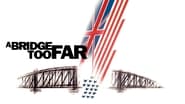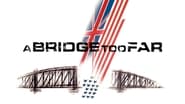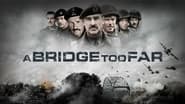aldebaran68
This is one of my all-time favourite war epics. Its not just a movie it deserves the title 'Epic'.An all star cast that works very well together. Excellent production values. Where the heck did they get ALL that equipment from? Extraordinary. A script that never flags, is always consistent, relevant, to the point and yet very humorous where it matters. It bears repeated watching. I'd place it alongside classics like 'The Longest Day', without any problem. There are probably historical inaccuracies to do with chronologies or issues not mentioned below, but I'm not bothered by them. If I wanted abs. historical accuracy I'd watch a documentary, not a movie.I don't know if the following will be regarded as a spoiler so I'll put a warning just in case: There is to my mind only one problem with it, and this is no fault of the producers or the technical staff. It can't help being made in 1977. Unfortunately being filmed for the most part in urban settings, all those settings (architecture, clothing/hairstyles etc.) are contemporary to 1977, not to 1944. I've only just noticed it watching it now. It reminds of a similar problem with Anzio the movie with Robert Michum about the landings in Italy. The end scene of that film was entirely 1960s/70s. Spoilt the effect. But with 'A Bridge...', what could they do? It would have made an already vastly expensive undertaking costly beyond anyone's resources to have got everyone, all the Dutch civilians, to be kitted out in 1944 styles. And to build original looking sets for all the scenes. The expense would have been impossibly outrageous (before CG might have done the job). 1977 was probably the last time they could make an epic of WW2 with equipment available as originals or mock-ups. So, with that caveat, I give it a 9. It really deserves 10, but I think 9 says it all anyhow.
Michael A. Martinez
A Bridge Too Far falls under its own weight in many ways with a lot of distracting cameos and an overly bombastic score. Also, it stumbles right out of the gate with a completely historically inaccurate and oversimplified narration that certainly angered any veterans of the Eastern, Italian, or African Fronts by erroneously claiming that up until D-Day the Germans were winning the war. Much of the rest of the writing falters under banalities and clichés, with some real life historical figures such as British General Browning and German Field Marshall Model portrayed as utterly incompetent (winning The Battle of Arhhem only because of luck and British hubris rather than due to his own ability). As usual for most old-fashioned war movies, the Germans are portrayed as largely heartless and often doltish with the Americans heroic, the British pompous, and the Poles and Dutch as noble victims of their circumstances.However, the film has a lot going for it that World War II films up to that point hadn't done. The battle scenes manage to attain a level of chaos, brutality, and realism unmatched for another 20 years. In addition to showcasing a lot of fairly accurate equipment, the action is edited well with great sound design (aside from those squeaky "beep" ricochets) and pyrotechnics. The scene where XXX Corp. first encounters the German lines with its devastating artillery barrage and then stumbling into an ambush ranks among my favorite war scenes, accurately portraying the sheer wide-scale savagery and how quickly great plans can fall apart.As usual for "big" movies of the time, there really isn't a plot or character arcs because of just how many overlapping stories and vignettes there are. A few bigger stars like James Caan, Robert Redford, and Elliot Gould get only 2 scenes - one small one to introduce their character and one larger one in which they do something memorable to service the action, usually calling back to something their character said in their introduction as though each one had some vaguely ironic prescient ability. Some of the stunt-casting actually makes the film worse, such as Gene Hackman doing his best but completely failing to fool anyone into believing he's Polish.History buffs, such as myself, will get a big kick though out of the straightforwardness of the presentation of Operation Market Garden. It's interesting even to see the generals posit over maps and see their plans come to fruition inter-cut with the small stories of the regular people on the ground. The operation certainly deserved a big picture to tell its story and with impressively mounted spectacle in the age before CGI and visual effects. The larger screen you watch it on and the more interested in WW2 history you are, the more impressed you'll be.
MartinHafer
"A Bridge Too Far" reminds me of one of those Irwin Allen mega-epics of the 1970s. Like "The Towering Inferno" or "Earthquake", "A Bridge Too Far" is jam-packed full of celebrities and celebrity cameos...something that usually does not work very well. Similar films, such as "Midway", seemed to spend ALL the budget on stars and there was little left for anything else...such as a decent script or the limited and appropriate use of stock footage. So is this another overblown epic or is it worth seeing? After all, 90% of the budget must have been to pay these stars! Fortunately, while I was not in love with the film, I didn't hate it...and that makes it a whole lot better than the movies I just mentioned (particularly "Midway"...what a terrible film).The film is a very long (too long if you ask me) recreation of Operation Market Garden, a failed attempt by Allied troops to dislodge the Germans and take bridges in Holland. Again and again, you see troops being tossed into various fronts...with mostly expected results since you know ultimately the Germans won this battle and pushed off the offensive. It's competently made and the director used some creativity to make the battles seem more realistic (such as the use of fake Sherman tanks...as discussed in the IMDb trivia). My only reservations are the film's length, the odd casting of Gene Hackman (what WAS his accent?!) and the way the film seems to go out of its way to portray General Browning as a complete horse's butt...and I am not sure if this is reasonable or not. According to at least some folks, the General wasn't actually incompetent.
classicalsteve
Quentin Tarantino once said it's best for characters in an action film to avoid discussing "the plot" too much. In "A Bridge Too Far", the dialogue and settings are so campy and obvious, the experience lapses into too many cliché scenes. Also, there are more stars in this film than in the Milky Way Galaxy. As the film moves along, name and star actors keep popping up: Sean Connery, Gene Hackman, Eliot Gould, Anthony Hopkins, James Caan, and Ryan O'Neil are all either donning officer's uniforms or privates' gear, and I've named only about half of them!The story is certainly one worth exploring in a film: the failed military plan Operation Market Garden which occurred during early Fall of 1944 in which allied troops attempted to infiltrate Holland and push over bridges of the Rhine to enter into Germany as a means of more quickly ending the Second World War. It's not the actual story which is the problem; it's the realization which has much to be desired. Nearly every scene is filled with silly cliché drivel which has been used in war films from circa 1950 to 1965. It has much of the same issues as its predecessor "The Longest Day", in which high command, officers, and troops are constantly spewing over-the-top and/or unrealistic statements about the purpose of the endeavor.Even without having viewed this film before, I predicted who would play which character. The following are those on the allied side. Gene Hackman obviously would be one of the lone voices to object to the mission, and he was cast as Stanisław Franciszek Sosabowski, a Polish General aiding the allies. Hackman's accent doesn't sound Polish but like bad Scottish as he rails against the allied leadership concerning the attack! Michael Caine as Colonel Joe Vandeleur pops up in a few scenes, often running around in a jeep wearing an ascot tie and sporting binoculars. I wasn't exactly certain where he fit into the operation. Eliot Gould as Col. Robert Stout is also often in a jeep, swearing with a cigar in his lips. He seems like a throw-back to his character in the original M.A.S.H. film (not the television show) where he played Capt. "Trapper" John McIntyre, who also sported a cigar. Ryan O'Neil plays Brig. Gen. James Gavin whose character in the film is so ambiguous I didn't understand that he was in fact a general who did go on para-trooping missions with lower-ranking enlisted men. Ryan seemed far too young in the role of a bona fide general.The German side is little better. Hardy Krüger and Maximilian Schell lead among the German officers, but their dialogue and characterization ring of the issues in "The Longest Day". In other words, the Germans are portrayed as rather incompetent nincompoops who are constantly at attention like toy soldiers. One of the more silly exchanges is when one of the German high-command learn of the Allies para-trooping, they are dismayed they would be landing 12 km (about 7 miles) from the bridges over the Rhine. Duh. They're not going to land right on top of enemy lines, and the bridges are guarded by German infantry, which is shown later in the film. At one point, they also intercept allied plans from a wrecked Alley plane, but the high command immediately tosses them away, claiming they were placed there by the Allies as a means to fool the Germans. In point of fact, such plans were always brought to special intelligence departments for analysis by experts. In a similar story recounted in "The Man Who Never Was", the Germans received a planting of bogus plans aboard a wrecked airplane with dead "pilot", and they are eventually given to the Germans for intelligence analysis. That film was made 20 years before "A Bridge Too Far" and was far more realistic. The incredible dialogue is what really makes this film. Consider the following with James Caan: Private: You tell me, Eddie. You tell me I won't die. Caan: All right, you won't die. Private: No, no. Guarantee me. I want you to guarantee me I won't die. Caan: I guarantee you. Soldiers in combat don't really talk like this. Most of the time if not all the time, they avoided talking about death. Here is an example from the German side: General Ludwig: Forgive me, but there is a battle. And we are in the process of winning it. Dr. Jan Spaander: Winning and losing is not our concern - living and dying... is. Do people really talk like this in the midst of war? I don't think so. This film experience is like looking for Hitchcock in a Hitchcock film: everywhere different name actors pop up and you find yourself wanting to find the next one which is shown on the poster with little boxes for all the movie stars! The problem is there are just way too many roles for name actors, and I was getting confused as to where I was or which character was doing which task. It would been far better to focus on fewer characters and develop them well instead of relying on every war cliché imaginable and hoping it sticks like spaghetti thrown against the wall. Sometimes it sticks, but more often it doesn't.














